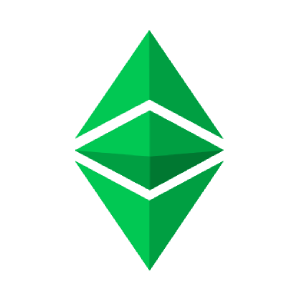BTC
$108,450.36
-
2.54%ETH
$2,557.76
-
3.85%USDT
$0.9997
-
0.02%XRP
$2.3519
-
3.08%BNB
$668.50
-
2.57%SOL
$175.98
-
0.58%USDC
$0.9995
-
0.01%DOGE
$0.2298
-
3.24%ADA
$0.7650
-
3.29%TRX
$0.2722
-
4.27%SUI
$3.6691
-
7.34%HYPE
$33.77
+
13.78%LINK
$15.88
-
2.08%AVAX
$23.35
-
3.62%XLM
$0.2909
-
2.98%SHIB
$0.0₄1456
-
3.49%BCH
$429.61
-
0.92%HBAR
$0.1934
-
3.18%LEO
$8.8043
-
1.10%TON
$3.0271
-
4.67%Sign Up
- Back to menuPrices
- Back to menuResearch
- Back to menu
- Back to menu
- Back to menu
- Back to menu
- Back to menuWebinars & Events

Ethereum Classic
$18.63
6.67%
Ethereum Classic Price Converter
Ethereum Classic Information
Ethereum Classic Supported Platforms
| BPETC | BEP20 | BNB | 0x3d6545b08693dae087e957cb1180ee38b9e3c25e | 2020-11-18 |
| BPETC | BEP2 | BNB | ETC-758 | 2020-11-18 |
| HWETC | ERC20 | ETC | 0x82A618305706B14e7bcf2592D4B9324A366b6dAd | 2021-12-28 |
| WETC | ERC20 | ETC | 0x1953cab0E5bFa6D4a9BaD6E05fD46C1CC6527a5a | 2022-05-06 |
About Ethereum Classic
Ethereum Classic (ETC) is a decentralized, open-source blockchain platform that uses proof-of-work consensus to execute and store smart contracts and dApps. It was created in July 2016 by a group of developers and users who opposed the Ethereum Foundation's decision to hard fork the Ethereum blockchain in response to the "DAO hack." ETC is used for a variety of purposes, including creating dApps and issuing tokens, and has a strong focus on immutability and censorship-resistance. It is led by a team of developers and supported by a global community of users and organizations.
Ethereum Classic (ETC) is a decentralized, open-source blockchain platform that uses a proof-of-work (PoW) consensus algorithm to enable users to securely and immutably execute and store smart contracts and decentralized applications (dApps). These smart contracts are written in a high-level programming language called Solidity and are executed by the Ethereum Virtual Machine (EVM), which is a decentralized, Turing-complete virtual machine that runs on the Ethereum Classic network.
Ethereum Classic is used for a wide variety of purposes, including the creation of decentralized applications (dApps) and the issuance of tokens, which can represent a variety of assets such as virtual currency, utility tokens, security tokens, and non-fungible tokens (NFTs). ETC is also used as a means of exchange, like traditional currencies, and can be bought, sold, and traded on cryptocurrency exchanges. In addition, Ethereum Classic has a strong focus on immutability and censorship-resistance, which has made it a popular choice for projects that require a secure and decentralized platform.
Ethereum Classic was created in July 2016 by a group of developers and users who opposed a decision by the Ethereum Foundation to hard fork the Ethereum blockchain in response to the "DAO hack," a controversial incident in which a vulnerability in a decentralized autonomous organization (DAO) built on the Ethereum platform was exploited to steal a large amount of Ether (ETH), the native cryptocurrency of Ethereum. The hard fork effectively reversed the hack and returned the stolen funds to their original owners, but some members of the Ethereum community believed that this violated the principle of immutability and decided to continue using the original, unmodified Ethereum blockchain, which became known as Ethereum Classic. The Ethereum Classic project is led by a team of developers and is supported by a community of users and organizations around the world.